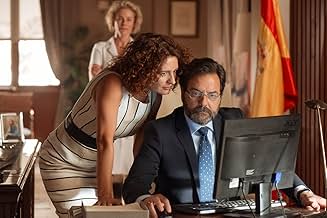Luis Salinas es el nuevo embajador de España en Tailandia y acaba de mudarse con su familia a Bangkok con el objetivo de limpiar la embajada de cualquier rastro de corrupción.Luis Salinas es el nuevo embajador de España en Tailandia y acaba de mudarse con su familia a Bangkok con el objetivo de limpiar la embajada de cualquier rastro de corrupción.Luis Salinas es el nuevo embajador de España en Tailandia y acaba de mudarse con su familia a Bangkok con el objetivo de limpiar la embajada de cualquier rastro de corrupción.
- Premios
- 3 nominaciones en total
Explorar episodios
Argumento
Opinión destacada
The writers (among which there are the creators of the recent and underwhelming "Bajo sospecha") bring us to Thailand where the newly appointed Spanish ambassador struggles to deal with the widespread corruption.
Up to the third episode the series appears solid and entertaining: the setting is original, the photography elegant and colorful, the plot fresh and realistic enough to let you accept few unlikely twists and characters. Furthermore the perspective on the balance between politics, business and social environment is quite original (for this kind of medium at least) and - as a consequence - well deserving a big plus. There are plenty of tragic moments where the protagonists need to act, have choices, but none of the outcomes is rightful, safe or pleasing.
The writers for sure have taken inspiration from the best series around (the prosecutors audition flashback form will easily remind you of something recent) and have done a lot of research and brainstorming to produce something as vivid.
The 2 "House of Cards" showed us how dirty actual politics in the most advanced countries can be. But as far as my knowledge goes none dared to show us (like the "evil" Eduardo does here) how that perspective is limited: it's not just politics, or information, or power or getting richer. Society isn't an assembly of isolated systems, everything is tightly connected: anywhere you live and act - country, company, community, public service, family - you need to play a game whose unwritten rules are far from being for "the good". And while you can't be "good" if you accept to play by the rules of these games, either you play or you "lose".
Did the writers wanted to hint that the world's problems aren't a matter of being honest and enforcing laws? Did they wanted to show us that since the dawn of societies these solutions haven't been working and never will as long as the game itself doesn't get changed? While I'm not certain about this - given the artistic resumes of some of them - I'm happy to see these topics presented without naive compromises to the mainstream.
Hopefully in the next episodes the authors will not fall in the "rinse and repeat" trap of 10 wow thrills per episode and will focus on character development and few core (believable) plot points. Actors do well on average.
Up to the third episode the series appears solid and entertaining: the setting is original, the photography elegant and colorful, the plot fresh and realistic enough to let you accept few unlikely twists and characters. Furthermore the perspective on the balance between politics, business and social environment is quite original (for this kind of medium at least) and - as a consequence - well deserving a big plus. There are plenty of tragic moments where the protagonists need to act, have choices, but none of the outcomes is rightful, safe or pleasing.
The writers for sure have taken inspiration from the best series around (the prosecutors audition flashback form will easily remind you of something recent) and have done a lot of research and brainstorming to produce something as vivid.
The 2 "House of Cards" showed us how dirty actual politics in the most advanced countries can be. But as far as my knowledge goes none dared to show us (like the "evil" Eduardo does here) how that perspective is limited: it's not just politics, or information, or power or getting richer. Society isn't an assembly of isolated systems, everything is tightly connected: anywhere you live and act - country, company, community, public service, family - you need to play a game whose unwritten rules are far from being for "the good". And while you can't be "good" if you accept to play by the rules of these games, either you play or you "lose".
Did the writers wanted to hint that the world's problems aren't a matter of being honest and enforcing laws? Did they wanted to show us that since the dawn of societies these solutions haven't been working and never will as long as the game itself doesn't get changed? While I'm not certain about this - given the artistic resumes of some of them - I'm happy to see these topics presented without naive compromises to the mainstream.
Hopefully in the next episodes the authors will not fall in the "rinse and repeat" trap of 10 wow thrills per episode and will focus on character development and few core (believable) plot points. Actors do well on average.
- Ladiloque
- 15 jun 2016
- Enlace permanente
Selecciones populares
Inicia sesión para calificar y agrega a la lista de videos para obtener recomendaciones personalizadas
- How many seasons does La embajada have?Con tecnología de Alexa
Detalles
Contribuir a esta página
Sugiere una edición o agrega el contenido que falta

Principales brechas de datos
By what name was La embajada (2016) officially released in Canada in English?
Responda






























